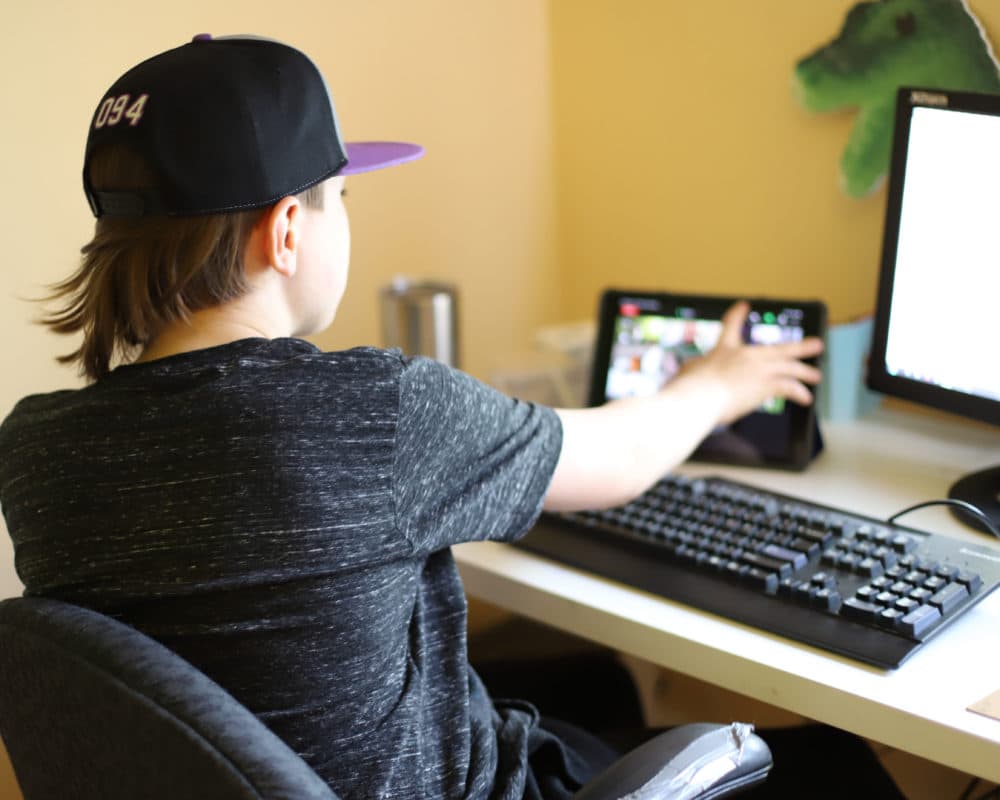Advertisement
Unexpected Lessons
For Anxious Students, Remote School Year Has Been A Bit Of Relief

Sixth-grader Harrison has a very simple routine each school week: Wake up, eat breakfast, get his mom to enable internet on his iPad, and log in to class.
Getting dressed didn’t quite make the list. Harrison loves that he can go to school in his pajamas. But it’s more than just the relaxed dress code.
"We didn't have to drive anywhere and didn't have to make a commute," Harrison added. "I guess it's nicer because some teachers are like loud-ish and you can turn down the volume."
Most importantly, though, home is a safe space that he’s familiar with. He also knows how seriously his family takes coronavirus precautions — something he can’t say about all of his classmates.
"I would not be comfortable in hybrid [classes], because for me, I have anxiety, so if someone like coughed, I don't know, I'd just just stay away from people," Harrison explained.
Join WBUR Thursday, May 20, at 6 p.m. for a Cityspace conversation about the losses and lessons of pandemic schooling. The event is open to the public and over Zoom.
His mom, Jen Manell, said the fact that Harrison can keep his distance from other students, especially during the COVID-19 pandemic has helped his anxiety. (WBUR is not using Harrison's last name to protect his privacy.)
"He's so perceptive," Manell said. "If he was in school, he'd be like, 'You don't have your mask on right. You're not distancing enough.' He'd just be overwhelmed with that kind of distraction."
Manell said even before COVID-19, Harrison struggled with the same kind of hyper-vigilance: Is his classroom safe? Are other students following the rules?
But at home, there are fewer things to be hyper-vigilant about.
Advertisement
"He can focus more," she said. "He's thriving. He’s thriving in sixth grade."
The pandemic did lead to major disruptions in how students go to school, and resulted in learning loss for a lot of students, although more research is needed. But for kids like Harrison, who have anxiety, the switch to remote learning was helpful in some ways. It gave them a brief reprieve from the things they usually worry about and time to work through that energy in a familiar place.
Still, Manell has mixed feelings about the idea of her kids learning from home in the long term. Mostly because they’re not interacting as much with other kids.
But Harrison believes remote learning still offers some unique ways to socialize, such as online office hours with teachers. One of his teachers lets the students stay on afterward to socialize.
"One time, we stayed online all night," Harrison recalled. "I actually made a lot more friends [this year] and I thought I would have."
And it wasn't just students who have anxiety that reported doing well this year. Some students with autism have made some gains this year, according to Andrea Parrish, with the IDEALS Institute at the Johns Hopkins University School of Education.
Parish thinks that’s because remote learning simplified the learning process for some kids.
"They can just focus on the content or just focus on the instructions at hand," she said. "And so they don't have to navigate all of those other sort of social experiences while they're learning."
While students still need to learn anxiety coping skills and social skills, maybe they don’t always have to do that at the same time as academics. Parrish could see a future where remote learning could be used in conjunction with in-person services, depending on a student’s learning needs.
"We usually look to traditional face-to-face sorts of accommodations and modifications to make it work," she said. "But now this is something that perhaps we could add to our menu of options."
As for Harrison, he’s looking forward to getting back to an in-person classroom next year. He misses his friends and even small things like doing assignments on actual paper. His mom is pretty pleased with how much he’s learned this year. And not just academically.
"It’s really helping with all of the rigid thinking you can have with anxiety," she said. "You can't be rigid and live through this. You have to keep going. There's been changes as people learn things and that's OK."
Which, she said, is an important life lesson too.
This segment aired on May 17, 2021.
